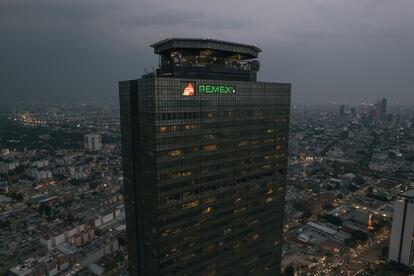The argument in favor of default for Pemex’s $110 billion in debt
Restructuring Pemex debt might send yields on other Mexican bonds soaring, but according to some experts, this is a scenario markets should consider

Improbable, but not impossible. In Mexico, conversations about the State-owned oil company, the most indebted in the world, often conclude that the government will help it pay its debt to avoid a restructuring that requires the company to negotiate with its lenders. However, as the end of President Andrés Manuel López Obrador’s six-year term approaches, some are being vocal about the possibility that a default in on the cards.
First it was Pimco, one of the world’s largest bond funds, announced in May that it had reduced its debt holdings in Petroleos Mexicanos (Pemex), as it did not expect the next government to be as generous with the oil company. Under López Obrador, the Ministry of Finance has made significant capital contributions to help Pemex pay its debt interests and has also reduced its tax burden. “This administration was perhaps the most pro-Pemex administration you would likely be able to get,” Pramol Dhawan, head of emerging market debt at Pimco, told Bloomberg. Future governments “may not be as friendly toward the credit” and advised that the market should be prepared for Mexico to reduce its support to Pemex.
Next, credit rating agencies Moody’s and Fitch, separately announced that they see a deterioration in Pemex’s debt repayment capacity. Finally, this week, an economist specializing in emerging markets at Capital Economics in England published a provocative report titled “Why Pemex will ultimately default.” In an interview with EL PAÍS, Jason Tuvey (London, 33 years old) argues that with such an enormous credit burden, something’s got to give.
Pemex has around $110 billion in debt, which is approximately 8% of Mexico’s Gross Domestic Product (GDP). Its interest payments have risen during this administration and, after rating agencies downgraded it from investment grade, Pemex’s bonds have been trading in the international market with much higher interest rates than sovereign debt. During the pandemic, yields on Pemex’s bonds traded 800 basis points higher return than sovereign bonds, while now they fluctuate between 450 and 600 basis points. This means that the risk of default for the oil company has made many investors who were willing to buy its debt over the years quite rich.
“There’s clearly already a lot of bad news priced into Pemex bonds,” says Tuvey “, so I think a lot of investors, people I’ve spoken to as well, priced for some sort of restructuring, whether that’s in the next couple or five, or ten years.” A restructuring is equivalent to a default, as it would require the company to negotiate with its creditors a new plan in which investors would be willing to give up some returns. A default would also have a contagion effect, sending interest rates of other Mexican bonds, such as those of the Federal Electricity Commission and private companies supplying Pemex, to spike.
But the benefit would be reflected in sovereign bonds, argues Tuvey. “I would argue, if anything, restructuring the Pemex debt would be a positive for the outlook for the sovereign bonds because you’d be reducing what has been a big drag on Mexico’s public finances in recent years,” he said.

During this administration, the Finance Ministry has made capital contributions and tax reductions amounting to 1% of GDP each year, according to Tuvey and his team, who expect that the next administration starting at the end of 2024 would have to increase those contributions to 1.5% of GDP. In Mexico, the government collects between 13% and 14% of GDP in taxes, below the average of its peers, which means it has a limited budget to cover the needs of health, education, infrastructure, and other areas for a country with 127 million inhabitants.
“Pemex has become an increasing drag on the economy and drain on Mexico’s public finances over the past 15 years,” they wrote in their report published on Tuesday. Crude oil production has fallen from a peak of nearly 3.5 million barrels in the mid-2000s to just over 1.5 million barrels today. “Combined with rising costs, the firm has suffered persistent losses,” the report states.
“There’s a broad reform that needs to happen there, but AMLO [López Obrador] hasn’t done that, and he’s got a year left. He’s not going to do it now. So really, he hasn’t actually helped Pemex in that regard because he’s just kept it on a sort of life support machine. He hasn’t given it the medicine that it needs,” Tuvey says.
Previous administrations had plans and discussions to slim down Pemex, selling off businesses that were not very profitable, such as refining, partnering with private companies to explore and produce in new fields, and negotiating with the union to reduce labor liabilities. López Obrador reversed the previous negotiation and increased labor liabilities. Tuvey acknowledges that Pemex has reduced its workforce over the past five years, but not enough.
“If it were to get productivity back to its level at its peak in 2004, that would require reducing the workforce by another 50,000 people out of 120,000 altogether,” says Tuvey. “If the next administration comes out and says, ‘yes, we’re going to slim down Pemex, we’re going to introduce tax reform, labor reform, we’re going to make it a profitable company’, that might go some way to delaying at least a restructuring,” he adds.
Sign up for our weekly newsletter to get more English-language news coverage from EL PAÍS USA Edition
Tu suscripción se está usando en otro dispositivo
¿Quieres añadir otro usuario a tu suscripción?
Si continúas leyendo en este dispositivo, no se podrá leer en el otro.
FlechaTu suscripción se está usando en otro dispositivo y solo puedes acceder a EL PAÍS desde un dispositivo a la vez.
Si quieres compartir tu cuenta, cambia tu suscripción a la modalidad Premium, así podrás añadir otro usuario. Cada uno accederá con su propia cuenta de email, lo que os permitirá personalizar vuestra experiencia en EL PAÍS.
¿Tienes una suscripción de empresa? Accede aquí para contratar más cuentas.
En el caso de no saber quién está usando tu cuenta, te recomendamos cambiar tu contraseña aquí.
Si decides continuar compartiendo tu cuenta, este mensaje se mostrará en tu dispositivo y en el de la otra persona que está usando tu cuenta de forma indefinida, afectando a tu experiencia de lectura. Puedes consultar aquí los términos y condiciones de la suscripción digital.









































